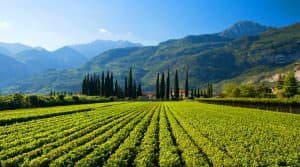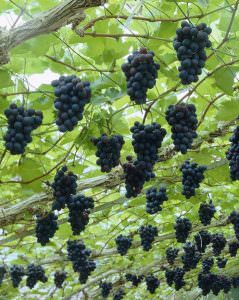Labouring in the Vineyard
Therefore I tell you, the kingdom of God will be taken away from you and given to a people that produces the fruits of the kingdom. (Mt 21:43)
1.
 A few years ago I visited the vineyards of the Mornington Peninsula, west of Melbourne. Maybe you know them. It’s easy to be romantic about a place like this: the afternoon light shines through the fig trees, and all around are miles of vine tresses and rich soil. The grapes ripen in the sunshine, slowly and happily. Life is unhurried; and of course I was unhurried, too, sitting there with a full-bodied red.
A few years ago I visited the vineyards of the Mornington Peninsula, west of Melbourne. Maybe you know them. It’s easy to be romantic about a place like this: the afternoon light shines through the fig trees, and all around are miles of vine tresses and rich soil. The grapes ripen in the sunshine, slowly and happily. Life is unhurried; and of course I was unhurried, too, sitting there with a full-bodied red.
Life just as God intended—a vision of fertility, of abundance, of ease. This is what the vineyard conjures up for us; and this is how the scriptures speak of Israel. It was planted the fairest vine.
Yet something went wrong. The prophet Isaiah says
“Let me sing for my beloved my love-song concerning his vineyard: My beloved had a vineyard on a very fertile hill. He dug it and cleared it of stones, and planted it with choice vines; he built a watchtower in the midst of it, and hewed out a wine vat in it; he expected it to yield grapes, but it yielded wild grapes.” (Isa 5)
Ancient Israel did not yield its good fruit. In today’s reading we hear Jesus speaking of the treacherous tenants of the vineyard, who would overthrow the order of things: therefore, he says “I tell you, the kingdom of God will be taken away from you and given to a people who produce the fruits of the kingdom.” (Mt 21)
Now we by faith are part of that fruit-bearing vine. We ourselves are tendrils or leaves or maybe even ripe grapes. That vine is Christ: I am the true vine he says and, as we used to say in the old language, my father is the husbandman. We who are on the vine must bear fruit: we are called to live with all the abundance and ease of the vineyard.
We are called to live as God intended.
2.
 When I was thinking on this theme my mind kept returning to an ancient liturgy I happened to read once—the Liturgy of St Mark. It was one of the very early services of the Church in Egypt. And what I love about it is the way its words summon up visions of abundance. It is a prayer that seems to bathe the world in the rich light of the vineyard.
When I was thinking on this theme my mind kept returning to an ancient liturgy I happened to read once—the Liturgy of St Mark. It was one of the very early services of the Church in Egypt. And what I love about it is the way its words summon up visions of abundance. It is a prayer that seems to bathe the world in the rich light of the vineyard.
I thought I’d read some of it to you:
Ever defend, O Lord, our journey through this life from trouble and storm.
Send down rich and copious showers on the dry and thirsty lands.
Gladden and revive the face of the earth, that it may spring forth and rejoice in the raindrops.
Make the waters of the river flow in full stream.
Gladden and revive the face of the earth with the swelling waters.
Fill all the channels of the streams, and multiply the fruits of the earth.
Bless, O Lord, the fruits of the earth, and keep them safe and unharmed.
Fill them with seed, and make them ripe for the harvest.
Bless even now, O Lord, Your yearly crown of blessing for the sake of the poor of Your people, the widow, the orphan, and the stranger, and for the sake of all of us who have our hope in You and call upon Your holy name; for the eyes of all are upon You, and You give them bread in due season.
O You who gives food to all flesh, fill our hearts with joy and gladness, that at all times, having all sufficiency, we may abound to every good work in Christ Jesus our Lord.
Here is a vision of abundance, a great harvest for humanity. The God of life, like the sun and the soft rain, brings all things to growth. Notice that we aren’t just praying that the fruit of the field will arrive, but that it will overflow in abundance–that it will be the great harvest which is a blessing to the poor, and a harvest of joy and gladness. That is the harvest we need!
3.

So we pray to the God of growth, the God of the harvest.
God is this abundance, this fruitfulness, this growth, this multiplication. And here is something very profound about our relationship to God: we lean into God, praying for something more than we have. We pray for something more than scarcity. We look to the sunshine and happiness of the vineyard.
When we pray like this, we stop being so obsessed about our own sense of lack and scarcity, and we actually become fruitful. We stop worrying about ourselves, what we will eat and drink, and move into the life that is sharing. God promises us abundance.
And if we lean into God, we will have an abundance—but probably not, actually, the abundance we imagined at first. Not, perhaps, troves of treasure or a fleet of cars. But we will have the good harvest which God grants us.
Now to return to that great image we began with: we ourselves are part of the fruitful vine, who is Christ. I am the true vine, says our Lord, and my father is the husbandman. How do these old words go? Every branch in me that beareth not fruit he taketh away: and every branch that beareth fruit, he purgeth, that it may bring forth more fruit.
God the Father prunes the vine: yes, even for the fruitful of the earth, there will be suffering. But even through our sufferings, we grow. That is what we are promised. Our sufferings will not destroy us, or be an incurable blight. They will be turned to good. We will grow through sufferings, purifying our desires, learning to grow differently. And therefore, in God, we will bring forth more fruit.
That is the life of the vine.
So may we all become fruitful in Christ and, yielding good fruit from thirty to an hundred fold, be found worthy of god’s kingdom.
Amen.


